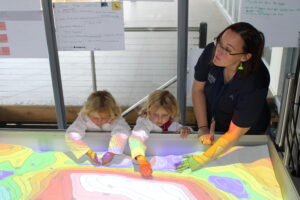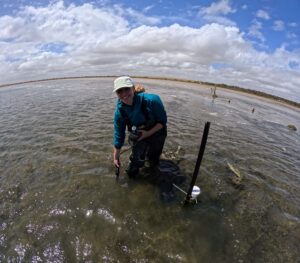
The Coorong is renowned nationally and internationally for its waterbirds. It is an important site for migratory species of the East Asian-Australasian flyway, an area that encompasses the annual migration route for over 50 million migratory waterbirds that extends from Arctic Russia and Northern America to Australia and New Zealand. The Coorong also provides important foraging and breeding habitat and summer/drought refuge for non-migratory birds. Historically, over 300 species have been observed within 1 km of the Coorong and Lower Lakes region, 119 of which are reliant on wetland habitats. In drought years, the region can support more than 90% of the waterbird species found across all six Living Murray Icon Wetland Sites within the Murray-Darling Basin, and between 100,000 to 300,000 birds are regularly supported in the region. However, for the Coorong South Lagoon, ongoing declines in the numbers of many waterbirds species have been observed, with declines in populations and habitat more severe in the Coorong than for other wetlands in Australia.
This article is the latest in a series of In Focus articles published in the Goyder Institute eNews on the Goyder Institute-led research being delivered as part of the $77.8 million Healthy Coorong, Healthy Basin (HCHB) Program. This initiative of the Australian and South Australian governments aims to support the long-term health of the Coorong by providing evidence-based solutions to both immediate threats and future conditions under a changing climate. The Goyder Institute for Water Research is the delivery partner for research components of HCHB, providing independent research to inform future management decisions for the region.
In this issue, we explore the research on waterbird populations in the Coorong being led by Associate Professor Phill Cassey and Professor Justin Brookes from The University of Adelaide in partnership with teams at Birdlife Australia, Deakin University and the University of Queensland.
A contributing factor to the decline in many waterbird species in the Coorong is thought to be a reduction in the availability in food resources, which itself is driven by fundamental modifications to hydrology and water quality.
“Over the past 20 years or more, the ecological condition of the Coorong South Lagoon has deteriorated, with increasing salinities in the Coorong South Lagoon and changes in hydrology” said Assoc. Prof. Cassey. “This has reduced both habitat availability and food resources for many waterbird species. Hypersalinity in the South Lagoon has reduced the abundance and diversity of prey species for pisciverous birds and wading birds feeding on macroinvertebrates at the shoreline. Nutrient accumulation due to poor flushing also stimulates filamentous algal blooms, which impacts sediment quality and aquatic plants and forms algal mats that restrict waterbird access to food.” he said.
The waterbird research undertaken through the HCHB program is examining how to maintain viable populations of waterbirds in the Coorong South Lagoon, focussing on a number of key waterbird species: Australian pelican, sharp-tailed sandpiper, red-necked avocet and chestnut teal. This includes developing models to understand the likely response of these species to management scenarios. These models are informed by data collected to understand waterbird habitat quality; the importance of regional wetlands close to the Coorong; and how key waterbird species move within the Coorong and between these wetlands and beyond.
“Wetlands in the broader landscape provide a mosaic of different habitats that are required to support waterbird populations” said Dr Thomas Prowse, postdoctoral researcher on the HCHB Waterbirds project. “Birds move within and between the different wetlands as they search for suitable habitat and food resources” he said. “While the Coorong undoubtedly provides critical habitat for many species, as the condition of the Coorong South Lagoon has declined, we are finding that other, smaller wetlands in the region are really important for providing additional food and habitat sources”. This means that looking after the condition of the wetlands in the broader landscape can provide benefits to the waterbird populations of the Coorong, and vice versa.
By attaching GPS tracking units to key bird species, the research team are examining how the birds move around and how long they spend in different locations. But catching birds of the right size and sex to fit the tracking devices can be challenging.
“It certainly hasn’t been easy to catch some of the birds to tag them” Dr Prowse said. “To tag red-necked avocets, for example, we have to sneak up on them in the water at night time as they feed” he said. “It’s very difficult as they get spooked very easily and quickly fly away. But for those avocets that we have tagged, they are showing some really interesting movements up and down the Coorong and to other surrounding wetlands, as well as long distance movements to Victoria. When we examine the quality of the habitat that they are spending time at, we can gain a greater understanding as to what is important to those bird species”.
The team have also managed to tag some sharp-tailed sandpipers prior to the species’ winter migration to the northern hemisphere to habitats around southeast Asia and China.
“Sharp-tailed sandpipers are small-medium sized birds that typically weigh less than 100 grams as adults. The satellite tags we are using to track them weigh less than 2 grams so that they don’t affect the birds in flight.” said Dr Prowse. “We managed to tag some of these ‘Sharpies’ just as they began their migration, and one bird flew to northern South Australia, spending a number of weeks in the Lake Eyre basin. Another bird flew directly to the Tenant Creek area of the Northern Territory, covering 1,967 km in less than 38 hours. Unfortunately the tags then stopped transmitting and we lost track of those birds” he said. “ But we are really excited that these ‘Sharpies’ are returning to the Coorong as part of their summer migration in the coming weeks. We hope to be able to tag some more birds to examine their summer movements within the Coorong and their movements as they depart northwards again in the Autumn”.
“By collating historical data on the key waterbird species, as well as using the new data we are collecting as part of the HCHB Waterbirds project, we are able to develop and produce new and updated models to provide a greater understanding of how waterbirds may respond to different management scenarios” said Assoc. Prof. Cassey. “We have also had fantastic support and assistance from the Ngarrindjeri Aboriginal Corporation who have shared their knowledge on bird species and will be assisting with the tagging and monitoring of the birds this year” he said.
The next year of research being undertaken by the Goyder Institute team will collect further data on habitat quality and bird movements to help inform the refinement of models to help understand how key waterbird species will respond to management scenarios in the Coorong South Lagoon.
More information on the HCHB waterbirds research can be found here. For further information on the Goyder Institute-led HCHB research, please contact Dr Alec Rolston.
This project is part of the Department for Environment and Water’s Healthy Coorong, Healthy Basin Program, which is jointly funded by the Australian and South Australian governments.


